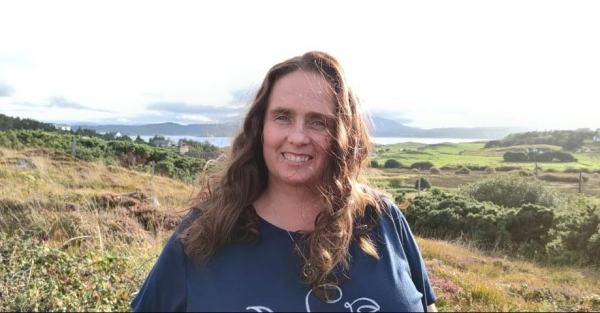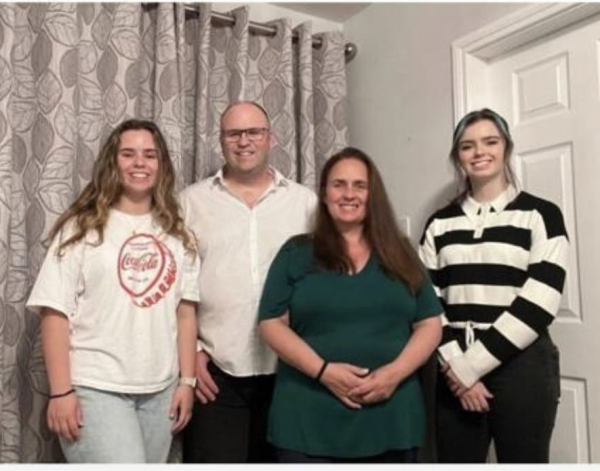
Nicole McKelvie, from Banbridge, was given her heart failure diagnosis at just 45 years old and it was the culmination of a lengthy and distressing battle to discover what was causing her health problems.
Nicole explains; “I was suffering from a lot of breathlessness. I have mild asthma, and I can forgive my GP for putting the breathlessness down to my asthma for a while, but I was back and forth over the course of around 18 months visiting the healthcare team in my group surgery. The doctors and nurse practitioners kept trying different inhalers, steroids, nebulisers, and nothing was working. In December 2022 I was told I would need to see a Respiratory Consultant and that my GP practice could do nothing more for me.”
“Whilst I was waiting to see the Consultant, I got worse. My breathing was so bad I could hardly hold a conversation. I couldn't walk up the stairs, I had to climb on my hands and knees, stopping to try and catch my breath. I went back to my GP and asked if there was anything else we could try because I wasn’t coping. She did a chest x-ray which came back red flagged within 72 hours. The x-ray showed my heart was enlarged and I was told I now also needed to see a Cardiologist. I felt so ill, I really felt like I was dying.”
“One day I was at work, where my husband also works, and I took a funny turn. My husband was taking me home but, on the way, he said he thought we should go to A&E. Amazingly, I was seen within 20 minutes at Craigavon Area Hospital A&E and within those 20 minutes I was told I was in acute heart failure.”
“I couldn’t believe what I was hearing and the experience of being given my diagnosis was traumatic. The doctor told me I had fluid up to my knees, and potentially in my lungs, he then stood up, walked away without looking at me and said, ‘you are in acute heart failure. I need to organise more tests’ and walked out of the room. It was a horrific experience. If I was being told I had something like cancer, I’m sure it would have been dealt with totally differently, with a lot more compassion but this was just very blunt and matter of fact. It was awful.”
Nicole continues; “I was taken to the Coronary Care Ward the next day for more tests including an echocardiogram which showed my ejection fraction, which is the amount of blood squeezed out of the main chamber of the heart with every heartbeat, was at just 5%. The Consultant told me that if I had left it another week I wouldn’t have survived. I had been working and doing everything as normal, but I was seriously ill and had no idea until that point. It all came as a complete shock. The staff in the Coronary Care Ward in Craigavon Area Hospital were amazing.”
“I spent about two and a half weeks in hospital. The medical team even reached out to the Freeman Hospital in Newcastle upon Tyne which is where heart transplants are performed because I was that ill. Thankfully, I responded positively to heart failure medication and my ejection fraction rose to 26% before I was discharged, and I was closely monitored by the heart failure nurses.”

A few months after her diagnosis, Nicole reached out to Northern Ireland Chest Heart & Stroke (NICHS), looking for support. “I went through their Family Support service which led to me taking part in one of their walking groups, and completing their Taking Control Self-Management and their Return to Work programmes. I am supporting NICHS’s heart failure awareness campaign because I am focussed on getting awareness of the condition out there as well as the importance of early diagnosis. Heart failure doesn't discriminate based on age or gender; it can affect anyone, and it is vital people know that.”
“I would also urge people to look out for heart failure in others, not just yourself. For example, if a loved one or friend is talking to you and they seem really out of breath, or if they are feeling tired all the time, or if you notice swollen ankles, encourage them to contact their GP to get checked out.”
Nicole continues; “I feel the medical profession needs to have it on their radar more too. It was six months before the possibility of something other than a respiratory condition was considered for me. If there had of been more outside the box thinking, my heart failure would have been picked up a lot earlier and I could have started treatment quicker too.”
“With the right treatment, heart failure can be managed and symptoms can be controlled for many years. We need to raise awareness and understanding about heart failure to help get people accurately and quickly diagnosed, referred for specialist treatment, and to receive core support regardless of age."

In a cruel twist of fate, Nicole’s twin sister, Farrah, was also diagnosed with the condition. “When I was in hospital, Farrah was visiting one day, and my Consultant said she needed to be screened for heart failure too. Farrah had no symptoms and no other health concerns, apart from asthma, but it was found she has it too which was a huge shock.”
“Unfortunately, Farrah’s experience with getting started on treatment was very negative. She lives in a different Health & Social Care Trust to me, and she had to fight to even get to see a Cardiologist and get her treatment started. She had to wait around eight months before she saw a heart failure nurse. By that stage, she knew everything she needed to know from me but that is not how it should be.”
“Another difference in how we have been treated is that I am receiving Cardiac Rehab, but Farrah hasn’t been offered this. I would be a big advocate for Cardiac Rehab because before it, I was petrified to do anything. Rehab has helped build my confidence back up and to know my limits of where I can push myself to. It helped give me some of my life back and I believe every heart failure patient should get the same treatment and support.”
The impact of heart failure on Nicole’s life has been massive, physically, and mentally. “I don't have the energy to get up and do things the way I used to. I will get a few days when I am fit for nothing, and I have to just sleep. It is hard for people to understand the fatigue unless they have experienced it. It isn’t a tiredness when you want to go to bed, I describe it as if somebody has taken my batteries out. I’m there but I’m not there.”
“I try to be positive, but I am petrified. I have spells when I am ok and then I will just breakdown and am scared that I am going to die. I get missed heart beats, extra beats, and different palpitations and they terrify me. I feel like I’m on borrowed time, but I just have to make the best of every day. I think things could be worse. Other people's stories are worse, like people waiting on a heart transplant.”
Nicole concludes; “I believe things happen for a reason and I think this has happened so that I could help start Heart Failure Warriors, a group which helps support people like me. Heart Failure Warriors is what is keeping me going mental health wise. If I didn't have that, I think it would be very easy to go into a very dark place.”
“Heart failure also doesn't just affect us as patients, it affects the whole family. My daughters, Louise 20, and Claire 18 weren’t themselves last Christmas and I asked them what was wrong. They said, ‘Mummy last Christmas we nearly lost you’. I didn't realise that was still playing on their minds. One day everything was ok and the next our worlds were turned upside down. It’s hard because they are worried about me and I tell them I’m fine, but how am I meant to reassure them whenever sometimes I can't even reassure myself? It is so difficult.”
Find out more about heart failure and how we can support you and your family.
